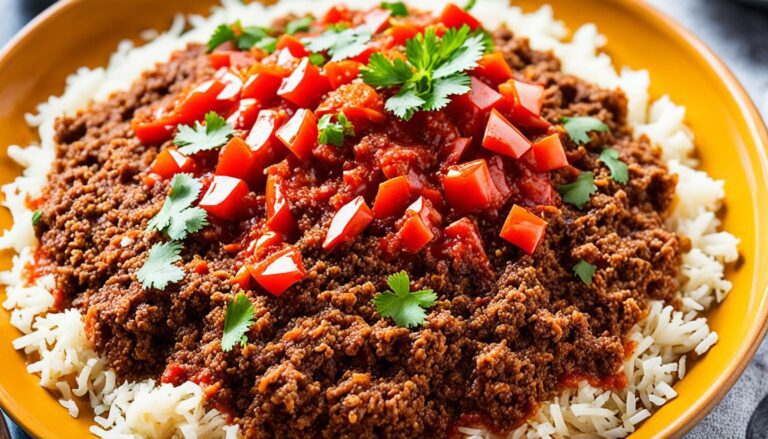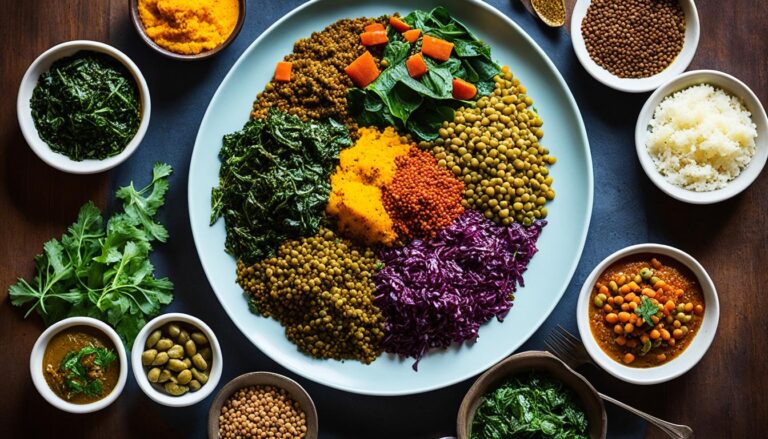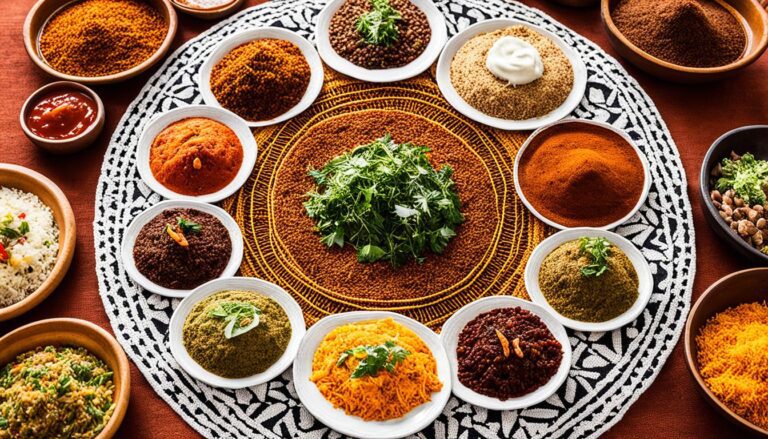Is Ethiopian Food Safe During Pregnancy?
When it comes to pregnancy, one of the top concerns is ensuring the safety of the food we eat. And if you’re a fan of Ethiopian cuisine, you might be wondering: Is Ethiopian food safe during pregnancy? Does it provide the necessary nourishment for both the mother and the baby? Let’s explore the answers and uncover the truth behind enjoying this vibrant and flavorsome cuisine during this crucial time.
Key Takeaways:
- Ethiopian food is a rich and diverse cuisine that can be enjoyed safely during pregnancy with some precautions.
- It provides essential nutrients for the mother and the developing baby.
- Understanding the common ingredients in Ethiopian food and their safety during pregnancy is important.
- By following expert tips, pregnant women can enjoy Ethiopian food while ensuring their health and the well-being of their baby.
- Embracing the flavors of Ethiopian cuisine can be a delightful and healthy part of an expectant mother’s journey when enjoyed in moderation.
Nutritional Benefits of Ethiopian Cuisine During Pregnancy
Ethiopian cuisine is a treasure trove of diverse flavors and vibrant ingredients. Not only does it tantalize the taste buds, but it also offers several nutritional benefits for both expecting mothers and their developing babies. Let’s explore the remarkable ways Ethiopian food can support a healthy pregnancy.
One of the key nutritional benefits of Ethiopian cuisine is its incorporation of various nutrient-rich ingredients. From lentils and chickpeas to spinach and collard greens, Ethiopian dishes often feature an array of vegetables and legumes that provide essential vitamins, minerals, and fiber. These nutrients are crucial for the overall health and well-being of both mother and baby during pregnancy.
Additionally, Ethiopian cuisine commonly includes lean meats, such as chicken and beef, which are excellent sources of protein. Protein is vital for the growth and development of the baby, as well as for maintaining the mother’s muscle mass and supporting healthy blood cell production.
Another standout ingredient in Ethiopian food is injera, a sourdough flatbread made from teff flour. Teff is a gluten-free grain and a rich source of iron, which is essential for preventing anemia during pregnancy. Iron plays a crucial role in transporting oxygen through the bloodstream and supporting the baby’s brain development.
Furthermore, Ethiopian cuisine often incorporates spices like turmeric, ginger, and cinnamon, which provide not only delightful flavors but also potential health benefits. These spices have anti-inflammatory and antioxidant properties, which can contribute to the overall well-being of the mother and baby.
Incorporating Ethiopian dishes into a pregnancy diet can be an excellent way to enjoy a flavorful and nutritionally-rich culinary experience. However, as with any cuisine, moderation is key. It is essential to maintain a balanced and varied diet throughout pregnancy, consulting with a healthcare professional or a registered dietitian for personalized guidance.
Now that we’ve explored the nutritional benefits of Ethiopian cuisine during pregnancy, let’s delve deeper into the safety of common ingredients found in Ethiopian food and how to enjoy this vibrant cuisine while ensuring the well-being of both mother and baby.
Common Ingredients in Ethiopian Food and Their Safety During Pregnancy
Ethiopian cuisine is renowned for its vibrant flavors and unique combination of ingredients. When it comes to enjoying Ethiopian food during pregnancy, it is essential to be aware of the ingredients used and their safety for expectant mothers. In this section, we will explore some common ingredients found in Ethiopian dishes and provide valuable information on their safety during pregnancy, ensuring the well-being of both the mother and the baby.
One popular ingredient in Ethiopian cuisine is injera, a type of sourdough flatbread made from teff flour. Teff, a gluten-free grain, is rich in essential nutrients, including iron and calcium. These nutrients are crucial for supporting the healthy development of the baby and maintaining the mother’s overall well-being during pregnancy.
Another widely used ingredient is berbere, an aromatic spice blend that adds a signature flavor to many Ethiopian dishes. Berbere typically consists of chili peppers, garlic, ginger, cardamom, cumin, and other spices. While spicy food is generally safe during pregnancy, it is essential to consume it in moderation, as excessive spicy food may cause discomfort or heartburn.
Legumes, such as lentils and chickpeas, are also common in Ethiopian cuisine. They provide a good source of plant-based protein, dietary fiber, and essential minerals. Including legumes in your diet during pregnancy can contribute to the overall nutritional balance, supporting the healthy growth of the baby and helping to manage pregnancy-related constipation.
Leafy green vegetables, such as collard greens and kale, are frequently incorporated into Ethiopian dishes. These greens are packed with important vitamins and minerals, such as vitamin C, vitamin K, and folic acid. Folic acid is particularly crucial during early pregnancy as it aids in the development of the baby’s neural tube and can help prevent certain birth defects.
In addition to these ingredients, Ethiopian cuisine often includes various meats and fish. It is important for expectant mothers to ensure that these proteins are cooked thoroughly to eliminate the risk of foodborne illnesses that can harm both the mother and the baby.
Remember, nutrition is key during pregnancy, and incorporating a variety of ingredients found in Ethiopian cuisine can provide essential nutrients. However, it is always recommended to consult with your healthcare provider for personalized advice and to address any specific dietary concerns.

Tips for Safely Enjoying Ethiopian Food While Pregnant
Navigating the world of food during pregnancy can sometimes feel like walking through a minefield. However, when it comes to enjoying Ethiopian cuisine, there are ways to savor the flavors safely. Here are some practical tips and guidelines for pregnant women on how to make informed choices when dining out or cooking Ethiopian meals at home.
Eat at trustworthy Ethiopian restaurants
When dining out, choose Ethiopian restaurants with a reputation for safe and hygienic food practices. Look for establishments that prioritize ingredient quality and follow proper food handling and preparation standards. Checking online reviews or asking for recommendations from trusted sources can help you find reliable options.
Opt for well-cooked dishes
During pregnancy, it’s important to avoid any undercooked or raw foods that may pose a risk of foodborne illnesses. When ordering Ethiopian dishes, opt for cooked options such as well-done meats, fully cooked legumes, and thoroughly cooked vegetables. This ensures that any potential harmful bacteria or parasites are eliminated.

Be mindful of spicy flavors
While Ethiopian cuisine is known for its bold and flavorful spices, it’s essential to be mindful of your tolerance during pregnancy. Spicy foods can sometimes trigger heartburn or indigestion, which are common discomforts during this time. Adjust the spice level according to your preference and comfort to prevent any potential digestive issues.
Ask about ingredient and spice lists
If you have any dietary restrictions or specific concerns during pregnancy, don’t hesitate to ask about the ingredients and spices used in Ethiopian dishes. Most Ethiopian restaurants will gladly provide you with information about their menu offerings, allowing you to make informed choices that align with your needs and preferences.
Practice portion control
While Ethiopian cuisine can be tempting with its variety of flavors, practicing portion control is essential during pregnancy. Overeating can lead to discomfort and may contribute to excessive weight gain. Enjoy a well-balanced plate, being mindful of portion sizes and listening to your body’s hunger and fullness cues.
By following these tips, pregnant women can safely enjoy the flavorful world of Ethiopian food while keeping the well-being of both mother and baby in mind. Embark on a culinary adventure while prioritizing health and safety!
Conclusion
In conclusion, Ethiopian food can be enjoyed safely during pregnancy by understanding the nutritional benefits, being aware of the ingredients, and following our expert tips. Ethiopian cuisine offers a wide range of flavors and ingredients that can provide essential nutrients for both the mother and the developing baby.
By incorporating Ethiopian dishes into a well-balanced pregnancy diet, expectant mothers can enjoy the cultural experience of this vibrant cuisine while nourishing their bodies and supporting the healthy growth of their baby.
Remember, moderation and mindfulness are key. It’s important to listen to your body and consult with your healthcare provider to ensure specific dietary requirements are met during pregnancy.
So, if you’re craving a taste of Ethiopia, go ahead and savor the delicious flavors with confidence, knowing that you can safely enjoy Ethiopian food throughout your pregnancy journey.







